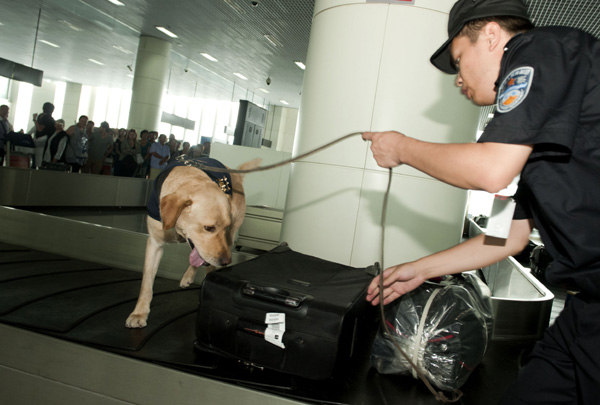Drug-related crimes on the rise in Xinjiang
|
A drug-sniffing dog checks luggage at Urumqi Airport, Xinjiang Uygur autonomous region, in June 2012. Wang Fei / Xinhua |
Several foreign suspects tried for their involvement: court official
The number of drug-related cases courts in the Xinjiang Uygur autonomous region have dealt with has increased significantly since 2010, a spokesman for the region's high court said on Thursday.
Several foreign suspects have been tried on drug trafficking charges, he added.
"The number of drug-related cases we handled between January and May increased by 18 percent compared with the same period last year," Yu Huitang, a spokesman for Xinjiang High People's Court, said during a briefing in Urumqi.
The incidence of drug crimes in Xinjiang remains high because of its special geographic environment, Yu said.
Xinjiang borders the Golden Crescent, one of the two principal areas in Asia for illicit opium production, which overlaps Afghanistan, Pakistan and Iran.
Besides Afghanistan and Pakistan, the autonomous region shares borders with another six countries, and international drug organizations view it as an ideal hub for transporting drugs to other cities in China as well as Central and South Asia, Yu said.
Hou Qin, presiding judge at the court, said the major opium farm in Afghanistan lies close to Xinjiang. Law enforcement on drug control in the war-torn country is weak and, as a result, production has expanded rapidly, with the opium production area in the Golden Crescent now nearly seven times bigger than in the Golden Triangle, the other main opium-producing area in Asia, Hou said.
Drug organizations desperately need to get drugs out of the area so it's no surprise that courts in Xinjiang often deal with drug-related cases involving foreigners, Hou added.
Two suspects from Pakistan were arrested in 2011 for smuggling more than 560 kg of heroin into Xinjiang from Pakistan by hiding it in a truck modified by a drug gang. The case is still being tried, Hou said.
In November, the Urumqi Intermediate People's Court gave a man from Tajikistan a death sentence with a two-year reprieve for drug trafficking. He swallowed 420 grams of heroin wrapped in condoms in Tajikistan in 2011 and entered Kashgar in southern Xinjiang. He then flew to Urumqi but was arrested after landing.
In 2009, a British man was given a lethal injection in Urumqi for carrying about 4 kg of heroin to the region in 2007. Under Chinese law, smuggling more than 50 grams of heroin can be punishable by the death sentence.
"We are extra careful about cases involving foreign suspects because every case could become a diplomatic issue," Hou said.
He said that judging by recent cases, terrorists have started to get involved in drug trafficking.
"Some drug organizations in nearby countries have military and even terrorist backgrounds. Such organizations use drug money to finance terrorist activities. The route of terrorists entering Xinjiang is the same as that of the drug traffickers. Some terrorist attacks in southern Xinjiang might be financed by drug money," Hou said.
The latest terror attack was carried out by a group in Selibuya, Kashgar prefecture, in April, leaving 15 people dead.
Police found 20 explosive devices, a large amount of bomb-making equipment, knives, combat training material, illegal extremist religious pamphlets and three jihadist flags.
Yuan Qin, also a presiding judge at the high court, said that apart from the usual drug-smuggling methods, such as internal concealment, ways in which drugs are carried have become more surprising and difficult to detect.
"Some put drugs in thin tubes and hide them in the wool of carpets, while others dissolve drugs in paper pulp and use the mixture to make packages to cheat the inspection system," he said.
cuijia@chinadaily.com.cn



















